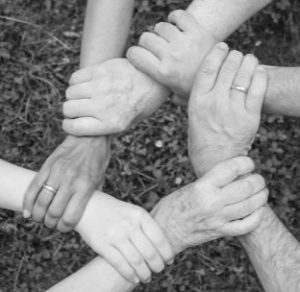REsources for Living
September 1, 2018Podcast: Download (Duration: 5:25 — 5.1MB)
Subscribe: More
 Our UU faith encourages us to be agents of change in the world.
Our UU faith encourages us to be agents of change in the world.
Rather than leaving it up to God to reward or punish people after they die, we think that folks should spend their lives not only trying to be ever-better human beings, but also trying to make the world an ever more just and compassionate place.
This is, of course, a tall order. Being an agent of change isn’t easy. Mostly individuals and social systems alike want to stay the same. “Homeostasis” is a high-priced word for exactly that phenomenon. In the same way that our bodies fight to stay at an internal temperature somewhere around 98.6 degrees regardless of what the weather is like outside, relationships between people—including complex social relationships—tend to actively preserve things as they are.
So how do we serve as agents of change? If our mission is to make the world a better place, what exactly is our job?
It seems to me that there are all kinds of jobs, all kinds of agents, and that some people naturally gravitate toward some roles more than others.
Most obviously, there are activists. Activists agitate. They lead protests and other symbolic actions, drawing the attention of both politicians and the general public to wrongs that need to be righted. They get arrested. They take to the streets with songs and banners. They sit in. They write letters, and ask their friends and neighbors to write letters. In whatever way they can, they pressure those with power to attend to the needs of the people.
Blessed are the activists, for they claim power for those who seem powerless.
Less obviously, behind the activists there are strategists. They plan. They identify not only what exactly they hope to change, but also where there are points in the system that might yield to pressure. They organize, build coalitions, foster conversations to help discern what the next move will be.
Blessed are the strategists, for they carry a map for the journey.
Somewhere in the mix of activists and strategists there are communicators, who cast a wide net to draw people toward the work of change. They articulate the message of existing wrongs and new possibilities in ways that change hearts and minds.
Blessed are the communicators, for they widen both the conversation and the community.
Significant social change only happens with the sustained efforts of large groups of people, but not all movement toward change happens in groups. Some agents of change are explorers, bold thinkers who are able to share both a clear picture of the world as it is and also a vision of the world as it might be. Explorers are people who offer possibilities. They are often historians, people who have a clear enough understanding of how we got to where we are to enable them to imagine where we might go from here.
Blessed are the explorers, who know the path we have traveled, and can imagine the road ahead.
Finally, there are artists, the creatives, people who, in music or paint or words or dance or sculpture or any number of other forms, create new worlds for us to inhabit. Artists give us the ability to not only see things as they are and to see other worlds that don’t yet exist, they also enable us to live in the gap between those two. Artists both create visions of what is possible, and invite us to live in the longing for something better than what we know.
Blessed are the artists, for they invite us into worlds of possibility.
Of course, many people operate in more than one of these categories, and a lot of us have a hard time finding our way into any of them. All the roles I’ve described are for different kinds of leaders, and the reality is that in many situations a whole lot of us not only aren’t called to be leaders, we shouldn’t consider ourselves leaders. If we are trying to be supportive of a community we are not members of, being a follower is probably a better choice.
But one way of being an effective agent for change is to look for the activists, the strategists, the communicators, explorers and artists who inspire us, and throw our weight behind their efforts. Rather than feeling inadequate and overwhelmed in the face of injustice, we can look for places where we might lean in, places where our own lives can shift toward something just a bit new, just a bit brave, just a bit outside our familiar comfort zone where we know what will happen because it has always happened that way before.
It might be scary. We might say the wrong thing or do the wrong thing or feel like we’re not up to the task. Remember, it is as natural to long for the safety of the familiar as it is for your heart to return to its customary beat.
But what feels natural and what feels possible are two different things. You can, through diligent exercise, actually change your natural resting blood pressure. And you can, through diligent exercise, move down new paths, re-envisioning your journey as one of creating change.
- REsources for Living - December 1, 2020
- A Fond Goodbye - December 1, 2020
- REsources for Living - November 1, 2020
Quest Monthly Print Edition
Recent Issues
Latest Spiritual Reflection Posts
Weekly Newsletter
About
Quest for Meaning is a program of the Church of the Larger Fellowship (CLF).
As a Unitarian Universalist congregation with no geographical boundary, the CLF creates global spiritual community, rooted in profound love, which cultivates wonder, imagination, and the courage to act.
Contact
Church of the Larger Fellowship Unitarian Universalist (CLFUU)
24 Farnsworth Street
Boston MA 02210

